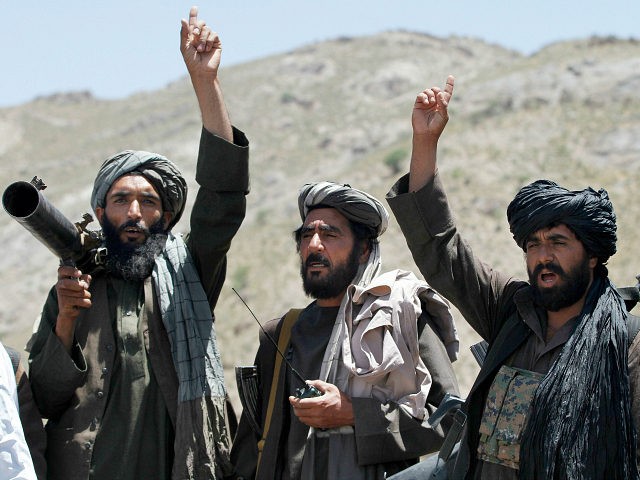A five-member Afghan Taliban delegation reportedly visited China last month at the behest of Beijing, which has been participating in efforts to bring the terrorist group to the negotiating table with the Afghan government.
Asked about the purpose of the Taliban political negotiators’ visit to China, an unnamed Taliban source told Pakistan’s Express Tribune: “The visit was part of the relations of the political office with European countries such as Norway, Germany, France, Britain as well as neighboring and regional countries. But these relations are focused on bringing about peace in Afghanistan and resolving the issue through negotiations.”
“Being a major world power, China is a main stakeholder and wants to play its vital role for peace and stability in Afghanistan,” added another anonymous Taliban source.
The meeting came days after Deng Xijun, China’s special envoy to Afghanistan, met with senior Afghan leaders, including U.S.-backed President Ashraf Ghani in the Afghan capital of Kabul.
Moreover, the Express Tribune notes that the Taliban jihadists visited China days after a meeting of senior diplomats from China, Pakistan, and Russia held a meeting in Moscow that notably excluded the United States and supported lifting sanctions imposed on the terrorist group’s leaders.
The Taliban’s political office in Qatar welcomed the outcome of the Moscow meeting, saying the major stakeholders “understood that the Islamic Emirate of Afghanistan is a political and military force.”
At the request of the Afghan government, China officially began to provide military aid to Afghanistan last year as former U.S. President Barack Obama’s administration reduced America’s military presence in the country amid rapidly deteriorating security conditions.
A recent article by the Military Times noted that Chinese ground troops are operating inside Afghanistan and the Pentagon is okay with their presence in the war-ravaged country where U.S.-led troops have been fighting the Taliban since October 2001.
The Express Tribune reports:
The Taliban Qatar [political] office chief Sher Abbas Stanikazai led a five-member delegation for talks with the Chinese officials…Regional experts are of the view that China has been actively trying to promote peace and stability in Afghanistan, particularly in view of the vacuum that has emerged in the country and the region due to the failure of American policy and subsequent drift and confusion in the US Afghan policy.
China’s autonomous region of Xinjiang, home to the country’s largest concentration of Muslim Uighurs, borders Afghanistan.
Uighurs fighting with the Islamic State (ISIS/ISIL), a Taliban rival that has established a presence in the Afghanistan-Pakistan region, recently vowed to attack China.
Citing the Pakistani Senate’s Committee on Defense Chairman Mushahid Hussain Sayed, the Express Tribune highlights Chinese objectives in Afghanistan, including preventing “any possible spillover into China of the lingering instability due to the Afghan civil war, particularly on the sensitive Xinjiang province of China that shares a border with Afghanistan.”
Gen. John Nicholson, the top commander of American and NATO troops in Afghanistan, described the 15-year-old-plus war as a stalemate, suggesting that President Donald Trump’s administration may increase the number of U.S. troops in the country and that its allies could once more expand their footprint.
The U.S. military dethroned the ruthless Taliban regime in 2001 and has been fighting the terrorists since. At least 2,247 U.S. troops have been killed in the ongoing, primarily at the hands of the Taliban.
Furthermore, there have been at least 20,196 American military injury incidents since the conflict started. The majority of U.S. military casualties, including both injuries and fatalities, took place under former President Obama’s watch.
During Obama’s presidency, the Taliban captured more territory in Afghanistan than during any other time since its removal from power in 2001.
As part of the Quadrilateral Coordination Group (QCG), China has long been working with the United States, Afghanistan, and its regional ally Pakistan in trying to persuade the Taliban to participate in face-to-face peace negotiations.
However, the efforts have failed. The Taliban refuses to negotiate because it insists it is winning the war against the U.S.-led coalition and its Afghan partners.
China has “encouraged the Taliban during our contacts with them to join the peace process,” Afghan President Ghani’s office said after the meeting with the Chinese envoy last month.
Xijun, the Chinese envoy to Afghanistan, added that “China has always conveyed to the Taliban during meetings that it recognizes the Afghan government and the president and that talks are the only option for them.”

COMMENTS
Please let us know if you're having issues with commenting.